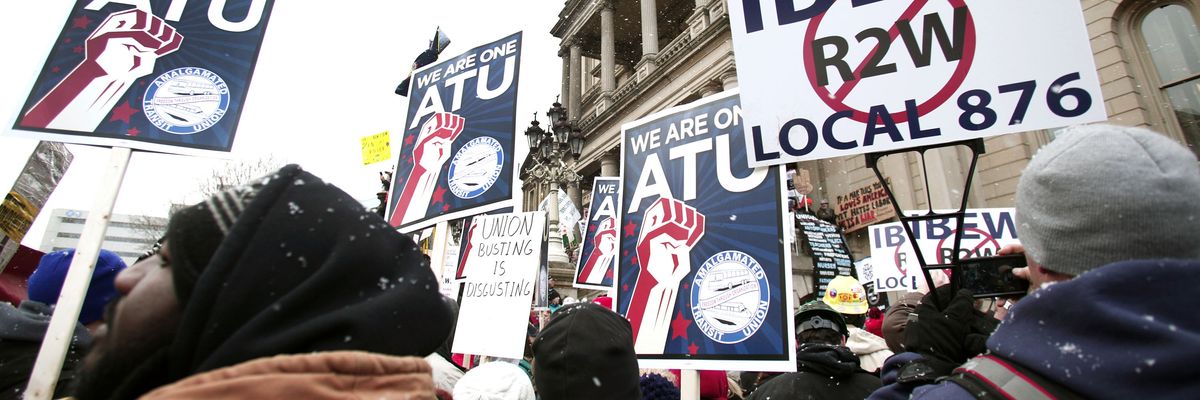Just over a decade after union members and labor advocates from across the United States rallied at the Michigan State Capitol to protest state Republicans' passage of a so-called "right-to-work" law, many of the same people were present in Lansing on Tuesday as the Democratic-led state Senate voted to end what one lawmaker
called "the failed experiment of gutting Michigan workers' rights."
Lawmakers voted along party lines, 20-17, in favor of a package of bills that will repeal the right-to-work law—which barred unions from requiring that all workers in unionized jobs pay dues—and restore a "prevailing wage" requirement that construction contractors pay union wages and and benefits on state-funded projects.
Democratic Gov. Gretchen Whitmer indicated on Monday that she intends to sign the bills, which will make Michigan the first state to roll back right-to-work laws in nearly six decades.
Since Republicans pushed the passage of the right-to-work law in December 2012, union membership in Michigan has fallen by about 40,000, according to the U.S. Bureau of Labor Statistics.
State Sen. Darrin Camilleri (D-4), the lead sponsor of the bills to repeal the right-to-work law, said on the Senate floor Tuesday that the 2012 law "systematically made it harder for unions to do their job" and "created an environment where unions were put at a disadvantage when it came to negotiating for better pay and benefits across the board."
"People came to Michigan because of the promise of a union," Camilleri tweeted after the bills passed. "My family included. Unions fought for good pay and benefits so that all workers get ahead. Today we restored that promise and said to all workers that Michigan has their back."
Camilleri added that lawmakers could hear union members and supporters "loud and clear" as they cheered the passage of the bills.
"This is what happens when we elect union members to halls of power," said Liz Shuler, president of the AFL-CIO, the largest federation of unions in the U.S. "We fight and we WIN for working people. Right to work, hit the curb!"
According toThe Detroit News, two of the three bills passed on Tuesday will have to go back to the state House for approval before reaching Whitmer's desk. The bills include $1 million in appropriations to "inform employers, employees, and labor organizations about changes to their rights and responsibilities."
The appropriations made the legislation referendum-proof, and opponents would need to gather enough support to propose a constitutional amendment restoring right-to-work on the ballot in 2024. Under state law, they would need to collect more than 446,000 signatures to propose the amendment.
According to the National Conference of State Legislatures, 26 other states have right-to-work policies in place.
"Michigan is now on its way to becoming the first state to repeal 'right-to-work' legislation in nearly 60 years," said former Kentucky state Rep. Charles Booker. "Let's make sure they aren't the last."
